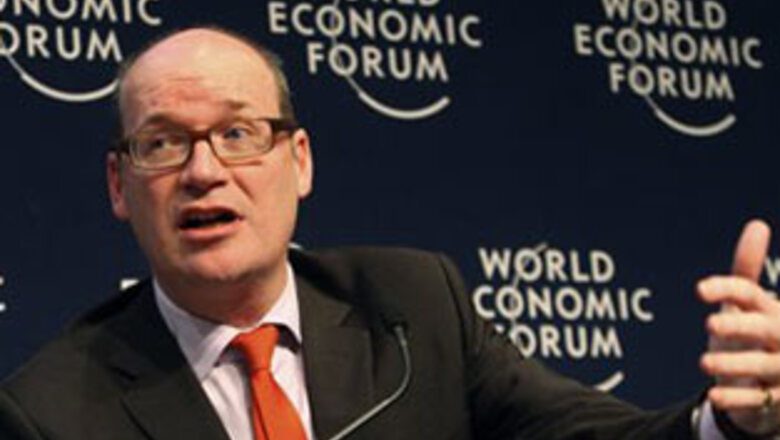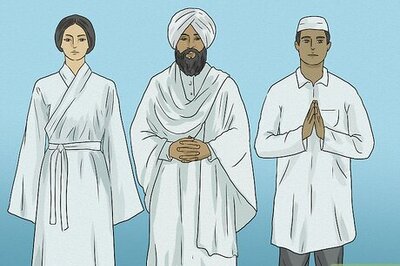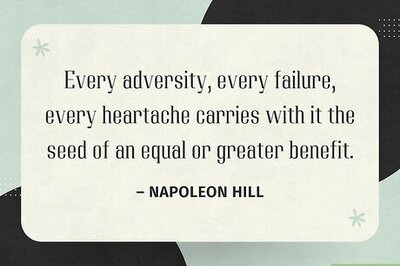
views
Davos, (Switzerland): The risks of an uneven global economic recovery — powered by a booming China and held back by unemployment in the US and other wealthy nations — dominated the agenda on Wednesday as the World Economic Forum opened in the Swiss Alps.
The five-day gathering of movers and shakers was assessing a host of issues facing the planet, from disaster aid in the aftermath of Haiti's devastating earthquake to reforms aimed at preventing another financial markets collapse.
But the most pressing concern was steadying a shaky world economy that is likely to face tough challenges in 2010 as rich world unemployment remains high and governments are forced to pull back from lavish bailouts and stimulus packages that have propped up banks and other industries.
"China alone cannot be the only engine of global economic growth," warned economist Nouriel Roubini, who gained prominence as a soothsayer of the current economic crisis. "In the first half, you are going to see the effects of the fiscal stimulus ... in the second half of the year you will see a fall in the US, Europe and Japan."
Some 2,500 participants — from presidents and CEOs to philosophers and artists — will debate economic recovery, job creation and the way forward in this picturesque Swiss resort, celebrating its 40th birthday as host of the world's pre-eminent forum for economic and political brainstorming.
French President Nicolas Sarkozy will formally open the event later on Wednesday, with other headliners including Presidents Luiz Inacio Lula da Silva of Brazil and Jacob Zuma of South Africa.
Former US President Bill Clinton will encourage big business to support Haiti's reconstruction, while Avatar director James Cameron and classical pianist Lang Lang are the event's top cultural representatives.
While in the past Davos has often been a key site for diplomacy, the focus of this year's meeting was clearly the economy and how to rebound from record unemployment.
The UN labour agency said 27 million people lost their jobs last year, with almost half of the losses in North America, Japan and Western Europe. The agency predicted an additional 3 million people in the rich world could lose their jobs or fail to find employment in 2010.
Dennis Nally, global chairman of PriceWaterhouseCoopers, said he was "cautiously optimistic" about growth this year. But, he warned that a number of problems remained, not least the stubbornly high unemployment in the United States and other industrialized economies.
"It's not a robust recovery from a job creation standpoint," he said.
Roubini, once dubbed "Dr Doom" for his grim economic assessments, saw some scope for optimism despite crunched credit markets and constrained banks.
"Obama's proposals on banking regulation are finally going in the right direction ... but they are not enough," he said Wednesday. "We should separate commercial banking from investment banking."
Roubini also warned against a return to the "business as usual" approach that created the crisis, but the chief executive of Britain's Standard Chartered Bank said his industry has been "fundamentally changed" by tighter regulations and supervision.
Governments may even be over-regulating the private sector and stifling growth, Peter Sands suggested.
"The stakes are very high," he said. "If we get it wrong in one dimension, we will end up stifling growth. If we get it wrong in the other dimension we end up with another crisis."
For emerging economies, the mood was mostly positive. While there was concern about an over-reliance on these new engines of growth, Nally suggested that China and India no longer be included among their ranks.
"It's a little bit unfair to call China an emerging market, India an emerging market and they're in the same category as Chad or Mozambique," Nally said. "In 2014, the GDP of the emerging markets will surpass the GDP of the developed markets. Some of these countries have emerged already. We should come up with a better term."
Some participants found the current economic uncertainty oddly reassuring.
"You see that everyone else is as worried as you are, that they have the same doubts," said Angel Gurria, who heads the Organization for Economic Cooperation and Development.




















Comments
0 comment